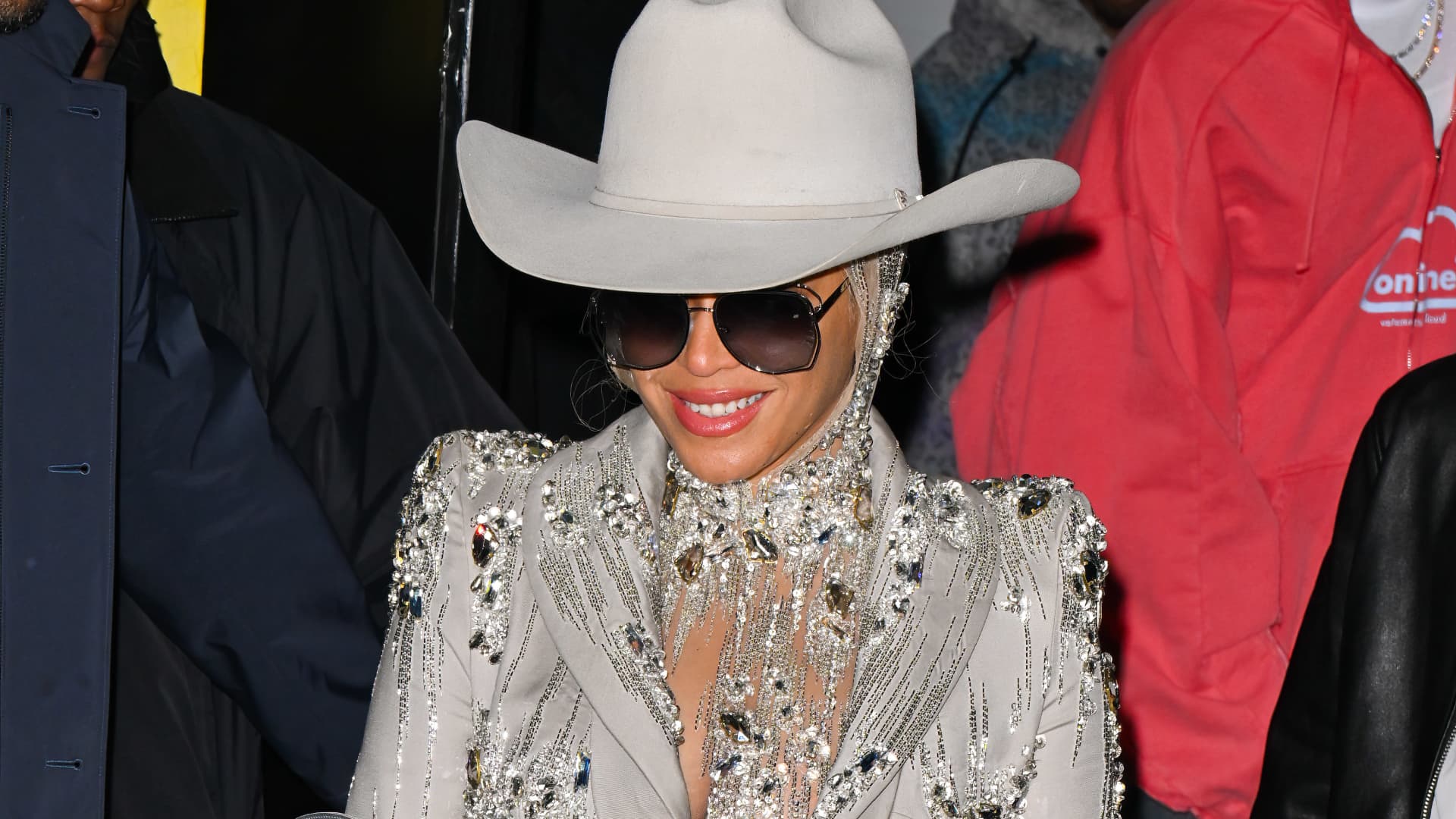Country music, meet Cowboy Carter.
Superstar singer-songwriter Beyoncé Knowles is foraying into country music — taking on a genre that has excluded women of color for decades and in the process proving its listeners have a strong interest in Black female artists. Her country music era, launched during a Super Bowl ad in mid-February and headlined by an upcoming album, is broadening the industry’s listenership and igniting streaming numbers for songs by other Black female country artists.
Country star Tanner Adell, a Black artist, saw U.S. streams of her track “Buckle Bunny” soar 305% during the first week of March, according to data from Spotify
Other Black female country artists like Mickey Guyton and Reyna Roberts saw boosts too, and Knowles’ own country-esque song “Daddy Lessons,” off her sixth studio pop album, “Lemonade,” spiked 540% in streams the day after her two country singles were released last month, Spotify reported.
“Texas Hold ‘Em,” one of those singles, made her the first Black woman to claim the No. 1 spot on Billboard’s Hot Country chart, according to the famed music magazine.
That song and her second recent country hit, “16 Carriages,” will appear on “Act II: Cowboy Carter.” Knowles announced the album title in a Tuesday post on her website. It follows “Act I: Renaissance” and serves as the second installment to a three-part project.
Knowles’ album announcement was a “pinnacle moment in time,” according to The New York Times bestselling author, country songwriter and lecturer Alice Randall, who was the first Black woman to write a No.1 song for an artist on the Hot Country chart, back in 1994.
“Beyoncé is signaling that Black women have been in country music almost since the beginning,” Randall said. “We have finally broken through the redlining that kept us out of the charts.”
Breaking into country
Acceptance for artists of color in country music remains a challenge, though, — even for Knowles, whose recorded songs are mostly categorized as pop and R&B.
While some music critics praised Knowles’ country tracks, other fans of the genre refrained from a warm welcome.
Two days after the release of “Texas Hold ‘Em” — coined as a “pop-country” track with elements from folk musician Rhiannon Giddens on the banjo — pop radio stations played the track 49 times, according to an X post by the radio industry tracker U.S. Radio Updater. But country stations played it only twice, according to the post.
Beyoncé fans — collectively known as the “BeyHive” — called in to an Oklahoma country station protesting the broadcaster’s initial rejection of a request to play “Texas Hold ‘Em.” In a separate occasion, a fan reported hearing a radio host comment that while the song is country and the instruments are country, “something else about it makes me think it’s not country.”
Of the more than 2,100 artists played on country radio stations from 2002 to 2020, only about 1.5% were Black, compared with about 98% who were white, according to a report from SongData on representation in country music. Other artists of color, including those who identified as Hispanic, Indigenous, biracial or Filipino, made up about 1% of artists played.
Beyond just radio, Black artists and artists of color represented less than 4% of country songs played on the radio, airplay, charting songs, artists signed to major labels and award nominations, according to SongData.
In the areas where artists of color did make strides over those two decades — gaining 3.2 percentage points in the share of songs played — the advances overwhelmingly benefited male artists of color, according to SongData. Among the artists of color whose songs received airplay, the report found that less than 3% were songs by women.
Some observers have argued the resistance to Knowles’ recent music stems from racism and political bias.
“Artists of color are releasing great music that sparks a great conversation but hasn’t shifted the underlying limitations and racist format of the mainstream country radio,” said Jocelyn Neal, professor and department chair of music at the University of North Carolina-Chapel Hill.
Country artists such as Maren Morris, Luke Combs and Kacey Musgraves have taken a more progressive approach than the traditional themes of beer, pickup trucks and rural living. Black LGBTQ hip-hop artist Lil Nas X dabbled in the genre with a “country-influenced” track, “Old Town Road.” The song was enmeshed in a racial debate after being removed from the Billboard Hot Country chart in 2019 after it was claimed the song lacked country elements when compared to other songs from the chart.
Political tensions have flared in the country music industry for decades, as newer and more liberal artists try to transition away from the genre’s “conservative” roots, Neal said. The genre’s fan base has long skewed conservative, she said.
Knowles — along with superstar Taylor Swift, who both had mega years in 2023 — received a higher percentage of negative ratings from registered Republicans than any other demographic of voters, across political affiliation, race and age, according to an NBC News poll. Of voters polled, 34% had a negative stance on Knowles, while 16% had a positive view. More than 40% of Republicans were neutral. Among registered Democrats who were polled, just 5% had a negative stance on Knowles and more than half had a positive view.
Beyoncé previously drew heat from country fans after the Houston native’s 2016 live performance of “Daddy Lessons” at the CMA Awards. She was joined by female country power group The Chicks, who made headlines in the early 2000s for speaking out against then-Republican President George Bush and the U.S. invasion of Iraq.
Younger listeners feeling the western vibe
As Beyoncé helps break the country mold, she’s inviting a younger audience into the western genre.
One such fan, Tenley Patterson, 26, said she didn’t bother listening to country music before Beyoncé’s releases, but was impressed with the country tracks.
“It’s not like country music I’ve heard before; it has a twang to it,” Patterson said. “It’s been slowly peaking my interest in the genre.”
While the average country music listener is a member of the baby boomer generation, those born between 1946 and 1964, according to music data firm Luminate, there’s been a newfound interest among listeners who are part of Generation Z — those born between 1997 to 2012 — and millennials, two generations reported to be more diverse than older age groups.
Country music in general saw an increase of 20 billion streams, a 24% year-over-year spike, from 2022 to 2023, according to Luminate.
Spotify’s Nashville team, which monitors the music streaming giant’s country genre, said it saw a rise in Gen Z and millennial listeners in response to Knowles’ entrance. Rachel Whitney, head of editorial for the Nashville team, said playlists outside of the country genre are playing Knowles’ country tracks, broadening its reach.
The Beyoncé draw is also boosting exposure for other artists on some lists, like Lainey Wilson and Cody Johnson, who have more “traditional” country songs, Whitney said.
“It’s amazing to see how country is connecting with younger listeners,” Whitney said. “We can support that with our playlists and make sure we’re not making country this one specific sound.”
Aside from Knowles, pop stars including Lana Del Rey and Post Malone are reportedly preparing to release country albums, according to Billboard. The news source says Ed Sheeran also could be releasing a country project in the near term.
UNC’s Neal, herself a Beyoncé fan, described the star’s career path as trailblazing, but said the push for diversity in country music requires more than one superstar.
“Historical evidence suggests it takes more than one successful artist to move the needle on what is honestly 100 years of genre formation,” Neal said.





